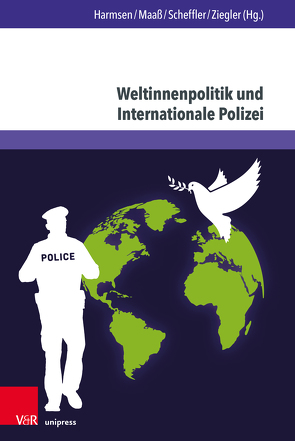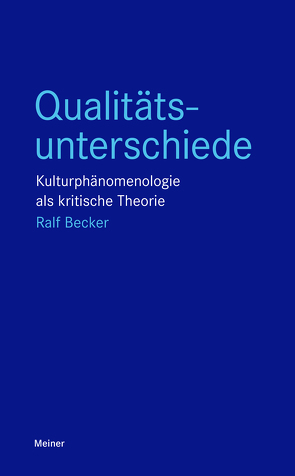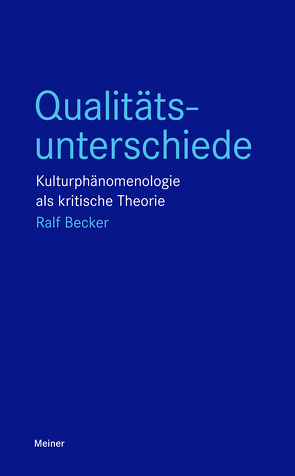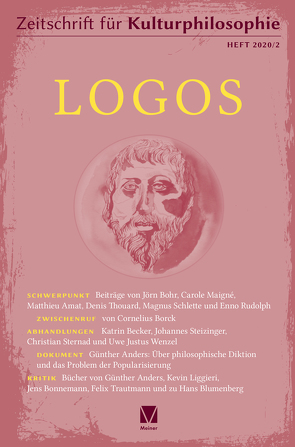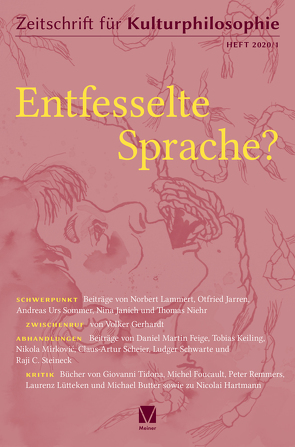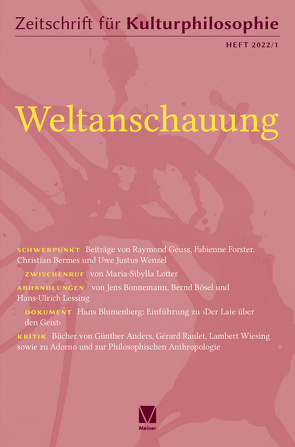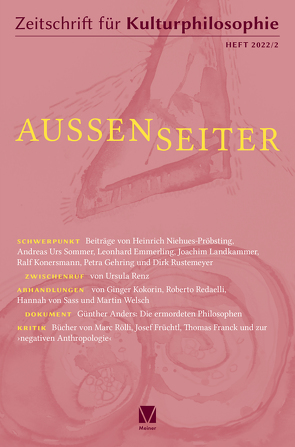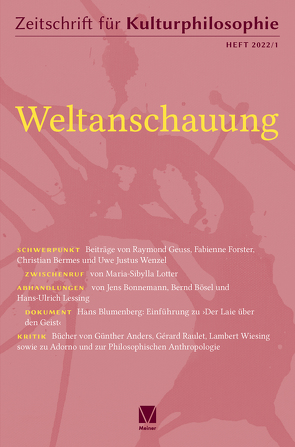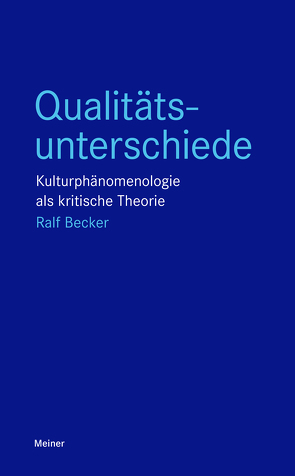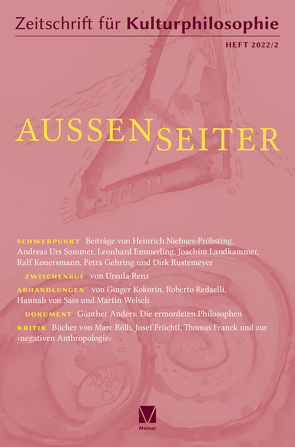Von nationalen Armeen und militärischen Bündnissen zu einer internationalen Polizei
Aktualisiert: 2023-06-28
Autor:
Ulrich Bartosch,
Ralf Becker,
Jochen Cornelius-Bundschuh,
Uta Engelmann,
Ute Finckh-Krämer,
Ullrich Hahn,
Dirk-M. Harmsen,
Hubert Heindl,
Wolfgang Heinrich,
Karin Hinrichs,
Thomas Hoppe,
Stefan Maaß,
Klaus Moegling,
Thomas Nauerth,
Matthias Rogg,
Traugott Schächtele,
Horst Scheffler,
Christine Schweitzer,
Wilhelm Schwendemann,
Theodor Ziegler,
Andreas Zumach
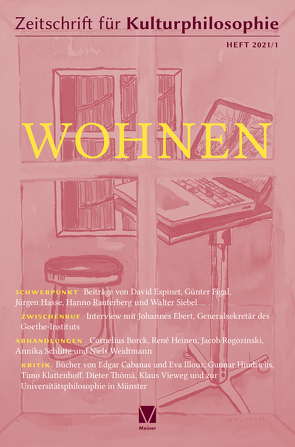
Abstracts
Becker, Ralf, Bermes, Christian, Westerkamp, Dirk: Editorial.
Rauterberg, Hanno: Rückzug ins Offene!. Wie das digitale Zeitalter neue Leitideen des Wohnens begünstigt und zugleich verstellt
The stronger the centrifugal forces of globalization become, the more people have to be on the move, the more uprooted they feel, the stronger the need for connection and encounter becomes. The desire for ›Heimat‹ is growing. But the digital transformation, which permeates all spheres of society and makes unexpected alliances possible, has little impact on housing, of all things. It favors new living desires that break away from old ideas of order and security and promote hybrid forms of behavior and life. At the same time, the constraints of a capital-driven housing industry are intensifying and rarely correspond to the otherwise common demand-driven goals and purposes of the capitalist economic order. While the digital mode of production and distribution aims for the greatest possible diversification and thus corresponds to the ideal of changeability, the housing market proves to be structurally conservative and usually only finds outdated answers to new demands—with the consequence that a ›right living in the wrong life‹ appears affordable for only a select few.
Siebel, Walter: Soziologie des Wohnens.
Sociology has a subject matter that is constantly changing. That is why it has to keep reformulating its theories and categories. One example is the profound change of housing during the course of industrial urbanization. This change is described as a change from the whole household (O. Brunner) to housing as part of the modern way of living based on the functional, social, socio-psychological, and economic dimensions of living. In connection with this change, the two basic aspects of the housing question are discussed: What defines a human habitat and why are new housing problems constantly emerging?
Hasse, Jürgen: Wohnen als Ausdruckssituation des Lebens. Auf dem Weg zu einer Ethik des Wohnens
Dwelling is understood in the sense of Martin Heidegger: »Dwelling is the manner in which mortals are on the earth.« The way in which people are living on earth situates them in their dwelling. Because dwelling is not an activity, but a mode of being, an ethics of dwelling is required because »habitability« of the earth is limited. This demands a sustainable way of life. Responsible housing therefore needs a structural pause in the growth-focussed process of civilisation. As a result, dwelling becomes a reason for a critical reflection on life and this becomes an existential piece of thinking about dwelling.
Espinet, David: Tische, Stühle und andere Gedichte. Zur Poetik des Designs als Ethik des Wohnens
In my paper, I interpret Hölderlin’s »poetic dwelling« in the sense of a contribution to the philosophy of design, i.e. a theory of beautiful yet functional artifacts. The interpretation aims at an ethics of aesthetics in which what I call ›poetry of design‹ is considered as a constitutive element for human autonomy in a world crammed with artifacts: good design is presented as morally good in the way that it does not interfere with self-determination, but instead promotes it because good design is beautiful.
Figal, Günter: Wohnbilder. Bewohnbare Architektur und Photographie
In this essay, I wish to elucidate the specific function architectural photography has for the experience of buildings. With photographs, the image character of buildings can be discovered and represented, and thereby the nature of habitation can be revealed as well. Taking or contemplating pictures of habitable rooms one could learn that habitation is primarily perceptional—a character mostly concealed by the dominance of everyday practice. In order to give an impression of the manifold possibilities architectural photography holds, I discuss the work of five quite different photographic artists, namely Julius Shulman, Yutaka Saito, Candida Höfer, Cy Twombly, and Yasuhiro Ishimoto.
Ebert, Johannes: »Man ist am Abend porös.« (Interview mit Johannes Ebert). Über digitale und physische Begegnungen und Kultur in Zeiten der Pandemie
Die ZKph im Gespräch mit Johannes Ebert, Generalsekretär des Goethe-Instituts.
Borck, Cornelius: Die Epistemologie von Forschungsumwelten. Zum Kasseler Projekt einer Philosophie der Tierforschung
Heinen, René: »Vergebliche Courage«?. Über Adornos versteckte Anthropologie und Ethik
Rogozinski, Jacob: Noli me tangere. Eine Erfahrung der Reversibilität in Zeiten der Pandemie
Schlitte, Annika: »A different sense of nature«. Ästhetische Perspektiven auf Natur-Kultur-Verhältnisse
Weidtmann, Niels: Die interkulturelle Dimension des Menschen.
Kritik.
Benjamin Bedersdorfer: Don’t criticise, be happy? Demontage einer Pseudowissenschaft (Edgar Cabanas/Eva Illouz: Das Glücksdiktat)Christian J. Emden »Geld ist die reinste Form des Werkzeugs«. Kulturphilosophie und Finanzialisierung in der Moderne (Timo Klattenhoff: Geld – Eine symbolische Form. Perspektiven mit Ernst Cassirer und Georg Simmel)
Christian Krijnen: Denken der Freiheit (Klaus Vieweg: Hegel. Der Philosoph der Freiheit. Biographie) Ursula Reitemeyer: Kontinuitäten und Brüche. Anmerkungen zum Strukturwandel des philosophischen Seminars in Münster (Reinold Schmücker / Johannes Müller-Salo (Hrsg.): Pietät und Weltbezug. Universitätsphilosophie in Münster)
Jennifer Stevens: Sinn und Unsinn der kritischen Theorie. Annäherung an ein Oxymoron (Gunnar Hindrichs: Zur kritischen Theorie)
Hartmut von Sass: Zwischen Genie und Apostel. Dieter Thomä und die Demokratisierung des Helden (Dieter Thomä: Warum Demokratien Helden brauchen. Plädoyer für einen zeitgemäßen Heroismus)
Aktualisiert: 2023-06-16
> findR *
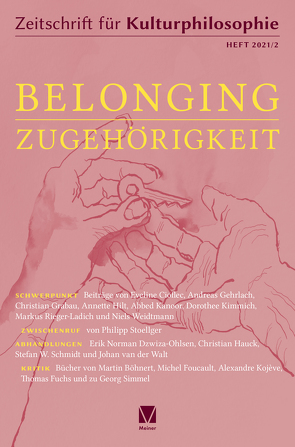
Becker, Ralf, Bermes, Christian, Westerkamp, Dirk: Editorial.
Cioflec, Eveline, Weidtmann, Niels: Einleitung. Belonging - Zugehörigkeit
Kimmich, Dorothee: Belonging – Zugehörigkeit und Eigentum. Eine prekäre Verbindung
»Belonging« is usually discussed in the context of social participation. However, the English »belonging« also associates – similar to the German word ›zugehörig‹– the aspect of possession and property: it is also about »belongings«. In the following, various examples from religion, politics, literature, and film will be used to discuss the narratives that intertwine social belonging and material possession and reveal as well as conceal their (neo)mythical connection.
Gehrlach, Andreas: Die Zugehörigkeit der Dinge zu den Menschen.
Western Culture knows only a single judicial concept of ownership: private property. Private property meaning, all things belong to people in the same normalized way. A closer look reveals that our relationship with things is more complex than that and confirms a gradual belonging of things to persons that stretches from an organic or intimate property to things being only vaguely attached to persons. This essay tries to outline this plural concept of ways of owning.
Cioflec, Eveline: Vom zugehörigen Selbst. Narrative der Gemeinschaft
In my paper I discuss belonging to a community as a lived experience aiming at interrogating with Hannah Arendt the dynamics of constituting or reshaping communities through action. The ungraspable »we« of communities allows for both constraining narratives and initiating new forms of belonging as a response to the need to belong. Acting together creates communities which can overturn the often painful experience of belonging to unbearable social units.
Kanoor, Abbed: Gezähmte Schizophrenie. Eine philosophische Analyse von Zugehörigkeit und kultureller Ich-Spaltung
Our time as the age of fragmented cultural ontologies, acceleration, and ongoing socio-cultural transformations is the age of the quest of belonging par excellence. My paper deals with this quest out of a singular culturally situated perspective – the work of the Indologist and comparative philosopher Daryush Shayegan (1935–2018) – which despite its singularity hints at a general hypothesis: the recognition of a tamed cultural schizophrenia can be an inspiring model of belonging for our time.
Rieger-Ladich, Markus: Tertium non datur. Über Gewalt und Zugehörigkeit
The books by Annie Ernaux and Didier Eribon can be interpreted as testimonies of the struggle for belonging. With their rich descriptions of growing up in poverty, of shame and degradation, they make an important contribution to the analysis of orders of belonging. Educational institutions play a significant role in this. In this way, Ernaux and Eribon shed light on the mechanisms through which belonging is created or denied.
Grabau, Christian: Umkämpfte Zugehörigkeit. Ralph Ellison und das Recht des Künstlers, seine Vorfahren zu wählen
»[W]hile one can do nothing about choosing one’s relatives, one can, as artist, choose one’s ›ancestors‹.« These words lead to the heart of a dispute between Ralph Ellison and the Dissent editor Irving Howe in the early sixties which had an impact far beyond literary criticism and scholarship. From this well documented controversy we can learn something about both the power of attributions of belonging and the art of evading them.
Hilt, Annette: Ein Zuhause, das mehr als Heimat ist. Phänomenologische Überlegungen zur Zugehörigkeit
My contribution interrogates how to conceive belonging and how to clarify conceptual connotations of this and other concepts as ›home‹ or a ›dwelling in a place‹ according to their meaning for orienting our social life and identities. Methodically, I start with the phenomenological consideration of ›operative concepts‹ and how these might be reflexively brought into work with experiencing loss of belonging, negation of a home to stay in, and infraction of identity as they are expressed in personal life-stories.
Weidtmann, Niels: Zugehörigkeit als Menschenrecht. Eine phänomenologische Intervention
Based on her own experience of long years of statelessness, Arendt demands that the right of the individual to belong to a political community be recognized as the only human right. However, while the »right to have rights« can serve as a regulative idea, belonging that respects an individual’s personhood can neither be decreed nor granted but must have constitutive meaning for the individual. In the article, belonging therefore is described as different ways of a human’s being-in-the-world or simply as different ways of experience.
Stoellger, Philipp: Von der Theodizee zur Religiodizee. Zur neuen Lust an der Religionslosigkeit
Dzwiza-Ohlsen, Erik Norman: Deixis – Grundzüge einer phänomenologischen Anthropologie des Zeigens. Deixis als Praxis zwischen Berührung und Begriff
Hauck, Christian: Fortschritt. Skizzen zu einer absoluten Metapher
Schmidt, Stefan W.: Phänomenologie der Räumlichkeit und die Gestaltung des Sozialen. Entwurf einer Topologie des Social Design
van der Walt, Johan: Recht, Poesie und liberale Demokratie. Überlegungen zu Voßkuhle, Kohlhaas und Kleist
Kritik.
Sophia Gräfe: Noch einmal nachdenken. Tierforschung für Philosophen (Martin Böhnert, Methodologische Signaturen. Ein philosophischer Versuch zur Systematisierung der empirischen Erforschung des Geistes von Tieren)
Arne Klawitter: Die Erfahrung des Fleisches und die Hermeneutik des Begehrens. Michel Foucaults vierter Band von »Sexualität und Wahrheit« (Michel Foucault, Die Geständnisse des Fleisches)
Nikola Mirković: Anerkennung als Autorität (Alexandre Kojève, Der Begriff der Autorität)
Johannes Röß: Krisenhaftes Denken. Erkundungen zu Georg Simmels Philosophie und ihrer Wirkung (Gerald Hartung/Heike Koenig/Tim-Florian Steinbach (Hrsg.), Der Philosoph Georg Simmel)
Volker Schürmann: Bekennender Anti-Reduktionismus (Thomas Fuchs, Verteidigung des Menschen. Grundfragen einer verkörperten Anthropologie)
Aktualisiert: 2023-06-16
> findR *
Quantifizierung macht Unterschiede zum Zweck des Messens zählbar, Digitalisierung macht Differenzen für Musterkennungen berechenbar. Da beide Methoden so erfolgreich sind, gerät zunehmend in den Hintergrund, was sich der Messung und Berechnung widersetzt: qualitative Unterschiede. Um diese geht es aber in der Philosophie.
Aktualisiert: 2023-06-16
> findR *
Quantifizierung macht Unterschiede zum Zweck des Messens zählbar, Digitalisierung macht Differenzen für Musterkennungen berechenbar. Da beide Methoden so erfolgreich sind, gerät zunehmend in den Hintergrund, was sich der Messung und Berechnung widersetzt: qualitative Unterschiede. Um diese geht es aber in der Philosophie.
Aktualisiert: 2023-06-16
> findR *
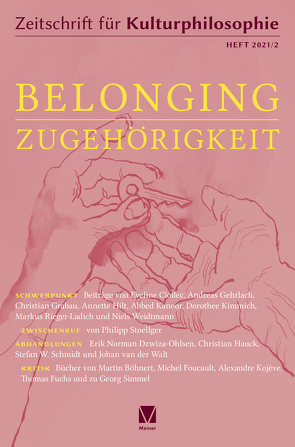
Becker, Ralf, Bermes, Christian, Westerkamp, Dirk: Editorial.
Cioflec, Eveline, Weidtmann, Niels: Einleitung. Belonging - Zugehörigkeit
Kimmich, Dorothee: Belonging – Zugehörigkeit und Eigentum. Eine prekäre Verbindung
»Belonging« is usually discussed in the context of social participation. However, the English »belonging« also associates – similar to the German word ›zugehörig‹– the aspect of possession and property: it is also about »belongings«. In the following, various examples from religion, politics, literature, and film will be used to discuss the narratives that intertwine social belonging and material possession and reveal as well as conceal their (neo)mythical connection.
Gehrlach, Andreas: Die Zugehörigkeit der Dinge zu den Menschen.
Western Culture knows only a single judicial concept of ownership: private property. Private property meaning, all things belong to people in the same normalized way. A closer look reveals that our relationship with things is more complex than that and confirms a gradual belonging of things to persons that stretches from an organic or intimate property to things being only vaguely attached to persons. This essay tries to outline this plural concept of ways of owning.
Cioflec, Eveline: Vom zugehörigen Selbst. Narrative der Gemeinschaft
In my paper I discuss belonging to a community as a lived experience aiming at interrogating with Hannah Arendt the dynamics of constituting or reshaping communities through action. The ungraspable »we« of communities allows for both constraining narratives and initiating new forms of belonging as a response to the need to belong. Acting together creates communities which can overturn the often painful experience of belonging to unbearable social units.
Kanoor, Abbed: Gezähmte Schizophrenie. Eine philosophische Analyse von Zugehörigkeit und kultureller Ich-Spaltung
Our time as the age of fragmented cultural ontologies, acceleration, and ongoing socio-cultural transformations is the age of the quest of belonging par excellence. My paper deals with this quest out of a singular culturally situated perspective – the work of the Indologist and comparative philosopher Daryush Shayegan (1935–2018) – which despite its singularity hints at a general hypothesis: the recognition of a tamed cultural schizophrenia can be an inspiring model of belonging for our time.
Rieger-Ladich, Markus: Tertium non datur. Über Gewalt und Zugehörigkeit
The books by Annie Ernaux and Didier Eribon can be interpreted as testimonies of the struggle for belonging. With their rich descriptions of growing up in poverty, of shame and degradation, they make an important contribution to the analysis of orders of belonging. Educational institutions play a significant role in this. In this way, Ernaux and Eribon shed light on the mechanisms through which belonging is created or denied.
Grabau, Christian: Umkämpfte Zugehörigkeit. Ralph Ellison und das Recht des Künstlers, seine Vorfahren zu wählen
»[W]hile one can do nothing about choosing one’s relatives, one can, as artist, choose one’s ›ancestors‹.« These words lead to the heart of a dispute between Ralph Ellison and the Dissent editor Irving Howe in the early sixties which had an impact far beyond literary criticism and scholarship. From this well documented controversy we can learn something about both the power of attributions of belonging and the art of evading them.
Hilt, Annette: Ein Zuhause, das mehr als Heimat ist. Phänomenologische Überlegungen zur Zugehörigkeit
My contribution interrogates how to conceive belonging and how to clarify conceptual connotations of this and other concepts as ›home‹ or a ›dwelling in a place‹ according to their meaning for orienting our social life and identities. Methodically, I start with the phenomenological consideration of ›operative concepts‹ and how these might be reflexively brought into work with experiencing loss of belonging, negation of a home to stay in, and infraction of identity as they are expressed in personal life-stories.
Weidtmann, Niels: Zugehörigkeit als Menschenrecht. Eine phänomenologische Intervention
Based on her own experience of long years of statelessness, Arendt demands that the right of the individual to belong to a political community be recognized as the only human right. However, while the »right to have rights« can serve as a regulative idea, belonging that respects an individual’s personhood can neither be decreed nor granted but must have constitutive meaning for the individual. In the article, belonging therefore is described as different ways of a human’s being-in-the-world or simply as different ways of experience.
Stoellger, Philipp: Von der Theodizee zur Religiodizee. Zur neuen Lust an der Religionslosigkeit
Dzwiza-Ohlsen, Erik Norman: Deixis – Grundzüge einer phänomenologischen Anthropologie des Zeigens. Deixis als Praxis zwischen Berührung und Begriff
Hauck, Christian: Fortschritt. Skizzen zu einer absoluten Metapher
Schmidt, Stefan W.: Phänomenologie der Räumlichkeit und die Gestaltung des Sozialen. Entwurf einer Topologie des Social Design
van der Walt, Johan: Recht, Poesie und liberale Demokratie. Überlegungen zu Voßkuhle, Kohlhaas und Kleist
Kritik.
Sophia Gräfe: Noch einmal nachdenken. Tierforschung für Philosophen (Martin Böhnert, Methodologische Signaturen. Ein philosophischer Versuch zur Systematisierung der empirischen Erforschung des Geistes von Tieren)
Arne Klawitter: Die Erfahrung des Fleisches und die Hermeneutik des Begehrens. Michel Foucaults vierter Band von »Sexualität und Wahrheit« (Michel Foucault, Die Geständnisse des Fleisches)
Nikola Mirković: Anerkennung als Autorität (Alexandre Kojève, Der Begriff der Autorität)
Johannes Röß: Krisenhaftes Denken. Erkundungen zu Georg Simmels Philosophie und ihrer Wirkung (Gerald Hartung/Heike Koenig/Tim-Florian Steinbach (Hrsg.), Der Philosoph Georg Simmel)
Volker Schürmann: Bekennender Anti-Reduktionismus (Thomas Fuchs, Verteidigung des Menschen. Grundfragen einer verkörperten Anthropologie)
Aktualisiert: 2023-06-16
> findR *
Mit Texten von Carole Maigné, Enno Rudolph, Magnus Schlette, Jörn Bohr, Matthieu Amat, Denis Thouard, Cornelius Borck, Katrin Becker u.v.a.
Aktualisiert: 2023-06-16
> findR *
Mit Texten von Norbert Lammert. Otfried Jarren, Andreas Urs Sommer, Nina Janich, Thomas Niehr, Volker Gerhardt, Daniel Martin Feige, Tobias Keiling u.v.a.
Aktualisiert: 2023-06-16
Autor:
Ralf Becker,
Christian Bermes,
Thomas Dworschak,
Daniel Martin Feige,
Jascha Gassen,
Volker Gerhardt,
Nina Janich,
Otfried Jarren,
Tobias Keiling,
Arne Klawitter,
Andrea Klonschinski,
Lothar Kreimendahl,
Norbert Lammert,
Heiko Liepert,
Daniel Minkin,
Nikola Mirkovic,
Thomas Niehr,
Claus-Artur Scheier,
Ludger Schwarte,
Andreas Urs Sommer,
Raji C. Steineck,
Dirk Westerkamp

Inhalt
Aufsätze und Abhandlungen
Das Problem Jean-Jacques Rousseau · Die Antike und die Entstehung der exakten Wissenschaft · Die Sprache und der Aufbau der Gegenstandswelt · Goethes Idee der Bildung und Erziehung · Psychologie und Philosophie · Shaftesbury und die Renaissance des Platonismus in England · Spinozas Stellung in der allgemeinen Geistesgeschichte · Vom Wesen und Werden des Naturrechts · Henri Bergsons Ethik und Religionsphilosophie · Hermann Cohens Philosophie der Religion und ihr Verhältnis zum Judentum · Le langage et la construction du monde des objets · L'unité dans l'œuvre de J.-J. Rousseau · Schiller und Shaftesbury
Goethe und die geschichtliche Welt. drei Aufsätze
Goethe und die geschichtliche Welt · Goethe und das 18. Jahrhundert · Goethe und Platon
Rezensionen und kleine Schriften
Der Naturforscher Goethe · Kant · Lieber Bruno · Leibniz · Bernhard Groethuysen, Philosophische Anthropologie · John Henry Muirhead, The Platonic Tradition in Anglo-Saxon Philosophy
Aktualisiert: 2023-06-16
> findR *
Brauchen wir Weltanschauungen? Wenn ja, wozu? Oft werden Weltanschauungen für politische, gesellschaftliche oder
individuelle Zwecke instrumentalisiert – sie kommen nicht selten in
Gestalt von Verheißungen daher und entpuppen sich ebenso häufig als
Zumutungen. In jedem Falle sind Weltanschauungen eine Herausforderung. Dieses Heft durchleuchtet, wie volatil und zugleich beharrlich,
wie komplex und zugleich vereinheitlichend die sinnversprechenden
Großnarrative sein können. Die Beiträge des Schwerpunktes kreisen das
Weltanschauungsproblem auf je unterschiedliche Weise ein und fragen
nach seiner Bedeutung für die kulturelle Wirklichkeit des Menschen
Aktualisiert: 2023-06-14
> findR *
Aktualisiert: 2023-06-14
> findR *
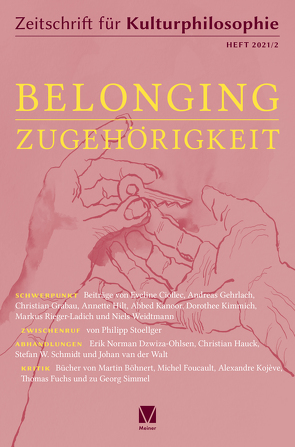
Becker, Ralf, Bermes, Christian, Westerkamp, Dirk: Editorial.
Cioflec, Eveline, Weidtmann, Niels: Einleitung. Belonging - Zugehörigkeit
Kimmich, Dorothee: Belonging – Zugehörigkeit und Eigentum. Eine prekäre Verbindung
»Belonging« is usually discussed in the context of social participation. However, the English »belonging« also associates – similar to the German word ›zugehörig‹– the aspect of possession and property: it is also about »belongings«. In the following, various examples from religion, politics, literature, and film will be used to discuss the narratives that intertwine social belonging and material possession and reveal as well as conceal their (neo)mythical connection.
Gehrlach, Andreas: Die Zugehörigkeit der Dinge zu den Menschen.
Western Culture knows only a single judicial concept of ownership: private property. Private property meaning, all things belong to people in the same normalized way. A closer look reveals that our relationship with things is more complex than that and confirms a gradual belonging of things to persons that stretches from an organic or intimate property to things being only vaguely attached to persons. This essay tries to outline this plural concept of ways of owning.
Cioflec, Eveline: Vom zugehörigen Selbst. Narrative der Gemeinschaft
In my paper I discuss belonging to a community as a lived experience aiming at interrogating with Hannah Arendt the dynamics of constituting or reshaping communities through action. The ungraspable »we« of communities allows for both constraining narratives and initiating new forms of belonging as a response to the need to belong. Acting together creates communities which can overturn the often painful experience of belonging to unbearable social units.
Kanoor, Abbed: Gezähmte Schizophrenie. Eine philosophische Analyse von Zugehörigkeit und kultureller Ich-Spaltung
Our time as the age of fragmented cultural ontologies, acceleration, and ongoing socio-cultural transformations is the age of the quest of belonging par excellence. My paper deals with this quest out of a singular culturally situated perspective – the work of the Indologist and comparative philosopher Daryush Shayegan (1935–2018) – which despite its singularity hints at a general hypothesis: the recognition of a tamed cultural schizophrenia can be an inspiring model of belonging for our time.
Rieger-Ladich, Markus: Tertium non datur. Über Gewalt und Zugehörigkeit
The books by Annie Ernaux and Didier Eribon can be interpreted as testimonies of the struggle for belonging. With their rich descriptions of growing up in poverty, of shame and degradation, they make an important contribution to the analysis of orders of belonging. Educational institutions play a significant role in this. In this way, Ernaux and Eribon shed light on the mechanisms through which belonging is created or denied.
Grabau, Christian: Umkämpfte Zugehörigkeit. Ralph Ellison und das Recht des Künstlers, seine Vorfahren zu wählen
»[W]hile one can do nothing about choosing one’s relatives, one can, as artist, choose one’s ›ancestors‹.« These words lead to the heart of a dispute between Ralph Ellison and the Dissent editor Irving Howe in the early sixties which had an impact far beyond literary criticism and scholarship. From this well documented controversy we can learn something about both the power of attributions of belonging and the art of evading them.
Hilt, Annette: Ein Zuhause, das mehr als Heimat ist. Phänomenologische Überlegungen zur Zugehörigkeit
My contribution interrogates how to conceive belonging and how to clarify conceptual connotations of this and other concepts as ›home‹ or a ›dwelling in a place‹ according to their meaning for orienting our social life and identities. Methodically, I start with the phenomenological consideration of ›operative concepts‹ and how these might be reflexively brought into work with experiencing loss of belonging, negation of a home to stay in, and infraction of identity as they are expressed in personal life-stories.
Weidtmann, Niels: Zugehörigkeit als Menschenrecht. Eine phänomenologische Intervention
Based on her own experience of long years of statelessness, Arendt demands that the right of the individual to belong to a political community be recognized as the only human right. However, while the »right to have rights« can serve as a regulative idea, belonging that respects an individual’s personhood can neither be decreed nor granted but must have constitutive meaning for the individual. In the article, belonging therefore is described as different ways of a human’s being-in-the-world or simply as different ways of experience.
Stoellger, Philipp: Von der Theodizee zur Religiodizee. Zur neuen Lust an der Religionslosigkeit
Dzwiza-Ohlsen, Erik Norman: Deixis – Grundzüge einer phänomenologischen Anthropologie des Zeigens. Deixis als Praxis zwischen Berührung und Begriff
Hauck, Christian: Fortschritt. Skizzen zu einer absoluten Metapher
Schmidt, Stefan W.: Phänomenologie der Räumlichkeit und die Gestaltung des Sozialen. Entwurf einer Topologie des Social Design
van der Walt, Johan: Recht, Poesie und liberale Demokratie. Überlegungen zu Voßkuhle, Kohlhaas und Kleist
Kritik.
Sophia Gräfe: Noch einmal nachdenken. Tierforschung für Philosophen (Martin Böhnert, Methodologische Signaturen. Ein philosophischer Versuch zur Systematisierung der empirischen Erforschung des Geistes von Tieren)
Arne Klawitter: Die Erfahrung des Fleisches und die Hermeneutik des Begehrens. Michel Foucaults vierter Band von »Sexualität und Wahrheit« (Michel Foucault, Die Geständnisse des Fleisches)
Nikola Mirković: Anerkennung als Autorität (Alexandre Kojève, Der Begriff der Autorität)
Johannes Röß: Krisenhaftes Denken. Erkundungen zu Georg Simmels Philosophie und ihrer Wirkung (Gerald Hartung/Heike Koenig/Tim-Florian Steinbach (Hrsg.), Der Philosoph Georg Simmel)
Volker Schürmann: Bekennender Anti-Reduktionismus (Thomas Fuchs, Verteidigung des Menschen. Grundfragen einer verkörperten Anthropologie)
Aktualisiert: 2023-06-14
> findR *
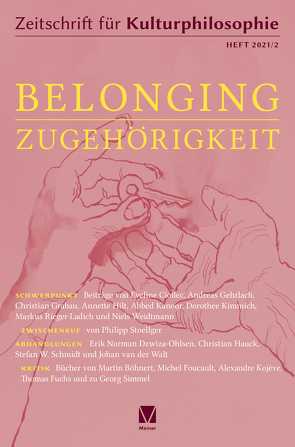
Becker, Ralf, Bermes, Christian, Westerkamp, Dirk: Editorial.
Cioflec, Eveline, Weidtmann, Niels: Einleitung. Belonging - Zugehörigkeit
Kimmich, Dorothee: Belonging – Zugehörigkeit und Eigentum. Eine prekäre Verbindung
»Belonging« is usually discussed in the context of social participation. However, the English »belonging« also associates – similar to the German word ›zugehörig‹– the aspect of possession and property: it is also about »belongings«. In the following, various examples from religion, politics, literature, and film will be used to discuss the narratives that intertwine social belonging and material possession and reveal as well as conceal their (neo)mythical connection.
Gehrlach, Andreas: Die Zugehörigkeit der Dinge zu den Menschen.
Western Culture knows only a single judicial concept of ownership: private property. Private property meaning, all things belong to people in the same normalized way. A closer look reveals that our relationship with things is more complex than that and confirms a gradual belonging of things to persons that stretches from an organic or intimate property to things being only vaguely attached to persons. This essay tries to outline this plural concept of ways of owning.
Cioflec, Eveline: Vom zugehörigen Selbst. Narrative der Gemeinschaft
In my paper I discuss belonging to a community as a lived experience aiming at interrogating with Hannah Arendt the dynamics of constituting or reshaping communities through action. The ungraspable »we« of communities allows for both constraining narratives and initiating new forms of belonging as a response to the need to belong. Acting together creates communities which can overturn the often painful experience of belonging to unbearable social units.
Kanoor, Abbed: Gezähmte Schizophrenie. Eine philosophische Analyse von Zugehörigkeit und kultureller Ich-Spaltung
Our time as the age of fragmented cultural ontologies, acceleration, and ongoing socio-cultural transformations is the age of the quest of belonging par excellence. My paper deals with this quest out of a singular culturally situated perspective – the work of the Indologist and comparative philosopher Daryush Shayegan (1935–2018) – which despite its singularity hints at a general hypothesis: the recognition of a tamed cultural schizophrenia can be an inspiring model of belonging for our time.
Rieger-Ladich, Markus: Tertium non datur. Über Gewalt und Zugehörigkeit
The books by Annie Ernaux and Didier Eribon can be interpreted as testimonies of the struggle for belonging. With their rich descriptions of growing up in poverty, of shame and degradation, they make an important contribution to the analysis of orders of belonging. Educational institutions play a significant role in this. In this way, Ernaux and Eribon shed light on the mechanisms through which belonging is created or denied.
Grabau, Christian: Umkämpfte Zugehörigkeit. Ralph Ellison und das Recht des Künstlers, seine Vorfahren zu wählen
»[W]hile one can do nothing about choosing one’s relatives, one can, as artist, choose one’s ›ancestors‹.« These words lead to the heart of a dispute between Ralph Ellison and the Dissent editor Irving Howe in the early sixties which had an impact far beyond literary criticism and scholarship. From this well documented controversy we can learn something about both the power of attributions of belonging and the art of evading them.
Hilt, Annette: Ein Zuhause, das mehr als Heimat ist. Phänomenologische Überlegungen zur Zugehörigkeit
My contribution interrogates how to conceive belonging and how to clarify conceptual connotations of this and other concepts as ›home‹ or a ›dwelling in a place‹ according to their meaning for orienting our social life and identities. Methodically, I start with the phenomenological consideration of ›operative concepts‹ and how these might be reflexively brought into work with experiencing loss of belonging, negation of a home to stay in, and infraction of identity as they are expressed in personal life-stories.
Weidtmann, Niels: Zugehörigkeit als Menschenrecht. Eine phänomenologische Intervention
Based on her own experience of long years of statelessness, Arendt demands that the right of the individual to belong to a political community be recognized as the only human right. However, while the »right to have rights« can serve as a regulative idea, belonging that respects an individual’s personhood can neither be decreed nor granted but must have constitutive meaning for the individual. In the article, belonging therefore is described as different ways of a human’s being-in-the-world or simply as different ways of experience.
Stoellger, Philipp: Von der Theodizee zur Religiodizee. Zur neuen Lust an der Religionslosigkeit
Dzwiza-Ohlsen, Erik Norman: Deixis – Grundzüge einer phänomenologischen Anthropologie des Zeigens. Deixis als Praxis zwischen Berührung und Begriff
Hauck, Christian: Fortschritt. Skizzen zu einer absoluten Metapher
Schmidt, Stefan W.: Phänomenologie der Räumlichkeit und die Gestaltung des Sozialen. Entwurf einer Topologie des Social Design
van der Walt, Johan: Recht, Poesie und liberale Demokratie. Überlegungen zu Voßkuhle, Kohlhaas und Kleist
Kritik.
Sophia Gräfe: Noch einmal nachdenken. Tierforschung für Philosophen (Martin Böhnert, Methodologische Signaturen. Ein philosophischer Versuch zur Systematisierung der empirischen Erforschung des Geistes von Tieren)
Arne Klawitter: Die Erfahrung des Fleisches und die Hermeneutik des Begehrens. Michel Foucaults vierter Band von »Sexualität und Wahrheit« (Michel Foucault, Die Geständnisse des Fleisches)
Nikola Mirković: Anerkennung als Autorität (Alexandre Kojève, Der Begriff der Autorität)
Johannes Röß: Krisenhaftes Denken. Erkundungen zu Georg Simmels Philosophie und ihrer Wirkung (Gerald Hartung/Heike Koenig/Tim-Florian Steinbach (Hrsg.), Der Philosoph Georg Simmel)
Volker Schürmann: Bekennender Anti-Reduktionismus (Thomas Fuchs, Verteidigung des Menschen. Grundfragen einer verkörperten Anthropologie)
Aktualisiert: 2023-06-14
> findR *
Brauchen wir Weltanschauungen? Wenn ja, wozu? Oft werden Weltanschauungen für politische, gesellschaftliche oder
individuelle Zwecke instrumentalisiert – sie kommen nicht selten in
Gestalt von Verheißungen daher und entpuppen sich ebenso häufig als
Zumutungen. In jedem Falle sind Weltanschauungen eine Herausforderung. Dieses Heft durchleuchtet, wie volatil und zugleich beharrlich,
wie komplex und zugleich vereinheitlichend die sinnversprechenden
Großnarrative sein können. Die Beiträge des Schwerpunktes kreisen das
Weltanschauungsproblem auf je unterschiedliche Weise ein und fragen
nach seiner Bedeutung für die kulturelle Wirklichkeit des Menschen
Aktualisiert: 2023-06-14
> findR *
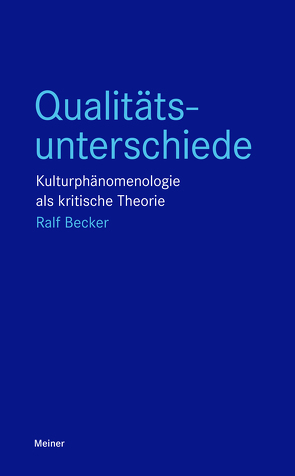
Quantifizierung macht Unterschiede zum Zweck des Messens zählbar, Digitalisierung macht Differenzen für Musterkennungen berechenbar. Da beide Methoden so erfolgreich sind, gerät zunehmend in den Hintergrund, was sich der Messung und Berechnung widersetzt: qualitative Unterschiede. Um diese geht es aber in der Philosophie. Ralf Becker stellt genau solche Qualitätsunterschiede in den Mittelpunkt seiner Untersuchungen: Farbe und Wellenlänge, Leben und unbelebte Materie, Teil und Ganzes, natürliche und kulturelle Tatsachen, Maßnehmen und Maßhalten. Die in seiner Analyse zur Anwendung kommende Kulturphänomenologie geht von der Wissenschaft als einer kulturellen Praxis aus, die in eine lebensweltliche Praxis des Unterscheidens eingebettet ist. Von diesem außerwissenschaftlichen praktischen Unterscheidungswissen bleibt auch die Naturwissenschaft methodisch abhängig. Zugleich bestimmt jedoch das Bild, das Menschen insbesondere von den Naturwissenschaften haben, das Bild, das sie sich von sich selbst und ihrer Stellung in der Welt machen. Die Rekonstruktion des methodischen Abhängigkeitsverhältnisses zwischen Wissenschaft und Lebenswelt, die Beckers Buch leistet, hat daher auch die kritische Funktion, das positivistische und szientistische Selbstmissverständnis über sich selbst aufzuklären.
Aktualisiert: 2023-06-14
> findR *
Quantifizierung macht Unterschiede zum Zweck des Messens zählbar, Digitalisierung macht Differenzen für Musterkennungen berechenbar. Da beide Methoden so erfolgreich sind, gerät zunehmend in den Hintergrund, was sich der Messung und Berechnung widersetzt: qualitative Unterschiede. Um diese geht es aber in der Philosophie.
Aktualisiert: 2023-06-14
> findR *
Aktualisiert: 2023-06-14
> findR *

Inhalt
Aufsätze und Abhandlungen
Das Problem Jean-Jacques Rousseau · Die Antike und die Entstehung der exakten Wissenschaft · Die Sprache und der Aufbau der Gegenstandswelt · Goethes Idee der Bildung und Erziehung · Psychologie und Philosophie · Shaftesbury und die Renaissance des Platonismus in England · Spinozas Stellung in der allgemeinen Geistesgeschichte · Vom Wesen und Werden des Naturrechts · Henri Bergsons Ethik und Religionsphilosophie · Hermann Cohens Philosophie der Religion und ihr Verhältnis zum Judentum · Le langage et la construction du monde des objets · L'unité dans l'œuvre de J.-J. Rousseau · Schiller und Shaftesbury
Goethe und die geschichtliche Welt. drei Aufsätze
Goethe und die geschichtliche Welt · Goethe und das 18. Jahrhundert · Goethe und Platon
Rezensionen und kleine Schriften
Der Naturforscher Goethe · Kant · Lieber Bruno · Leibniz · Bernhard Groethuysen, Philosophische Anthropologie · John Henry Muirhead, The Platonic Tradition in Anglo-Saxon Philosophy
Aktualisiert: 2023-06-14
> findR *
MEHR ANZEIGEN
Bücher von Becker, Ralf
Sie suchen ein Buch oder Publikation vonBecker, Ralf ? Bei Buch findr finden Sie alle Bücher Becker, Ralf.
Entdecken Sie neue Bücher oder Klassiker für Sie selbst oder zum Verschenken. Buch findr hat zahlreiche Bücher
von Becker, Ralf im Sortiment. Nehmen Sie sich Zeit zum Stöbern und finden Sie das passende Buch oder die
Publiketion für Ihr Lesevergnügen oder Ihr Interessensgebiet. Stöbern Sie durch unser Angebot und finden Sie aus
unserer großen Auswahl das Buch, das Ihnen zusagt. Bei Buch findr finden Sie Romane, Ratgeber, wissenschaftliche und
populärwissenschaftliche Bücher uvm. Bestellen Sie Ihr Buch zu Ihrem Thema einfach online und lassen Sie es sich
bequem nach Hause schicken. Wir wünschen Ihnen schöne und entspannte Lesemomente mit Ihrem Buch
von Becker, Ralf .
Becker, Ralf - Große Auswahl an Publikationen bei Buch findr
Bei uns finden Sie Bücher aller beliebter Autoren, Neuerscheinungen, Bestseller genauso wie alte Schätze. Bücher
von Becker, Ralf die Ihre Fantasie anregen und Bücher, die Sie weiterbilden und Ihnen wissenschaftliche Fakten
vermitteln. Ganz nach Ihrem Geschmack ist das passende Buch für Sie dabei. Finden Sie eine große Auswahl Bücher
verschiedenster Genres, Verlage, Schlagworte Genre bei Buchfindr:
Unser Repertoire umfasst Bücher von
- Beckerath, Astrid von
- Beckerath, Erich von
- Beckerath, Erwin v.
- Beckerath, Erwin von
- Beckerath, Gerhard von
- Beckerath, Gerhard von
- Beckerath, Hans-Jochem von
- Beckerath, Hans-Jochem von von
- Beckerath, Klaus von
- Beckerath, Paul Gert von
Sie haben viele Möglichkeiten bei Buch findr die passenden Bücher für Ihr Lesevergnügen zu entdecken. Nutzen Sie
unsere Suchfunktionen, um zu stöbern und für Sie interessante Bücher in den unterschiedlichen Genres und Kategorien
zu finden. Neben Büchern von Becker, Ralf und Büchern aus verschiedenen Kategorien finden Sie schnell und
einfach auch eine Auflistung thematisch passender Publikationen. Probieren Sie es aus, legen Sie jetzt los! Ihrem
Lesevergnügen steht nichts im Wege. Nutzen Sie die Vorteile Ihre Bücher online zu kaufen und bekommen Sie die
bestellten Bücher schnell und bequem zugestellt. Nehmen Sie sich die Zeit, online die Bücher Ihrer Wahl anzulesen,
Buchempfehlungen und Rezensionen zu studieren, Informationen zu Autoren zu lesen. Viel Spaß beim Lesen wünscht Ihnen
das Team von Buchfindr.

